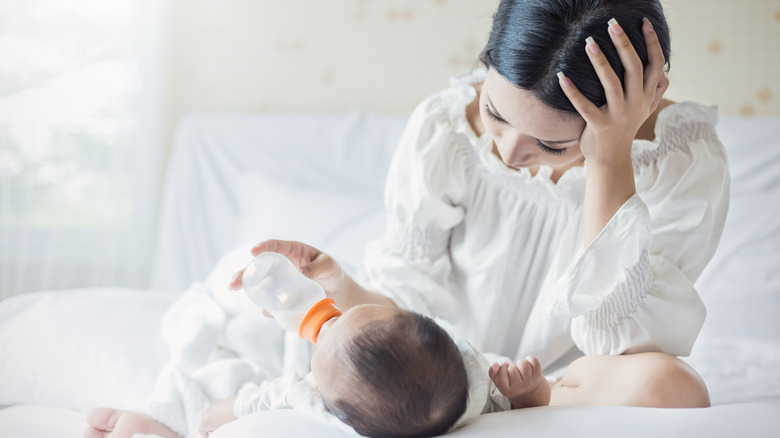Why Incontinence After Pregnancy Is So Common
A lot of things change after you've given birth. Perhaps sleep is harder to come by, and luxuriating showers become fewer and farther between. Much of your me time has turned into baby-and-me time, and your social life may be a little less full, but that's okay. Your heart is probably feeling as full as it can get — and unfortunately, so is your bladder.
Your body also did quite a bit of changing to accommodate your new little roommate, and for many, that might mean having to deal with postpartum incontinence. Urinary incontinence is characterized by involuntary urination, a symptom as many as 40% of birthing parents experience during or following pregnancy (per the University of Colorado). While urgently rushing to the toilet and worrying between bathroom visits may feel a little embarrassing, it's a perfectly normal symptom of both pregnancy and childbirth. We're going to take a look at why incontinence happens and what you can do to prevent it.
Why does incontinence happen?
Growing a tiny human is hard work, so it's no surprise that it can take a toll on the body. Many women may experience stress incontinence during or after the ordeal — a type of incontinence that is triggered by actions like coughing, laughing, or physical exertion (per Cleveland Clinic). That's because the bladder, which sits just under the uterus, responds to the pressure of your growing baby by flattening out a bit. With less room to hold urine, many people may find that they have to use the bathroom much more frequently during pregnancy. For most, this stops a few weeks after the baby is born. However, for 5% of birthing parents, these symptoms can last for up to a year (per UCLA Health).
As the baby grows in your belly, the extra weight can also cause the muscles of your pelvic floor to weaken, allowing for the passage of urine during pregnancy. These same muscles can also experience overstrain during the act of childbirth, which can leave your muscles too weak to do their job (per the University of Colorado). What's more, during childbirth some women may experience nerve damage in the bladder, rectum, or pelvic floor, a shifting of the bladder or urethra, or a tearing of the pelvic floor muscle, all of which can contribute to urinary (and sometimes even fecal) incontinence.
Risk factors for incontinence and how to prevent it
Postpartum incontinence is much more likely in those who also experienced incontinence during pregnancy. However, the circumstances surrounding the birth can also play a role (per the University of Colorado). Patients who experience long deliveries and those who require the use of forceps to help deliver the baby are more likely to experience these symptoms. Experiencing urinary incontinence after childbirth is also much more common in people with a higher body mass index (BMI), as well as in those who retain excess weight after the baby is born. The National Institute of Health also points out that vaginal births are 50% more likely to result in incontinence than cesarean deliveries.
Luckily, incontinence can often be improved with a few easy alterations. Avoiding bladder irritants like caffeine and spicy foods can help. Patients may also benefit from maintaining a healthy diet and a comfortable weight, which can drastically improve symptoms of incontinence (per the University of Colorado). Putting your bladder on a workout plan can also be beneficial. All you have to do is schedule your bathroom visits for a little while, gradually lengthening the amount of time between them. This will allow your bladder muscles to regain their strength.
Speaking of strength, if you're experiencing incontinence due to weakened floor muscles, it's time to start doing your Kegels. In some cases, it may even benefit you to see a pelvic floor physical therapist.



